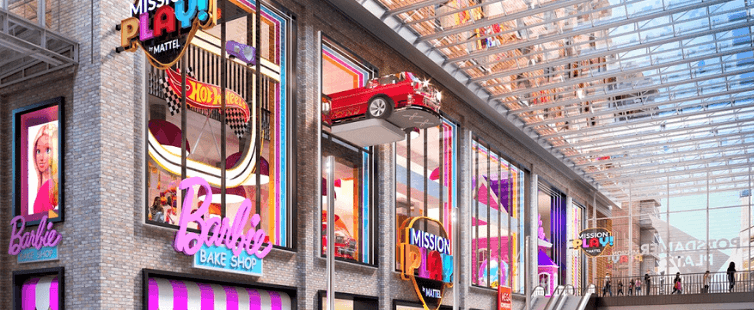FECs Move In as Malls Recast Themselves

The empty spaces left in malls by fallen retailers are providing long-sought entry for licensed family entertainment centers (FECs)as developers adapt their strategies to fit a new reality.
While FECs were starting to finding homes in malls pre-pandemic, the events of the past year have accelerated the trend. Mall operators, hit hard by closings and retail bankruptcies, are scrambling to fill vacant space and craft more of a lifestyle profile with more experiential elements.
Lifestyle Destinations
Brookfield Properties recently announced an agreement with FEC designer IP2 Entertainment and operator Planet Leisure Germany to open a 43,000-sq.-ft. Mattel Mission: Play! featuring Barbie, Mega Bloks and Hot Wheels brands. The deal caps a year-long refashioning of Brookfield’s Arkaden shopping center in Berlin as a lifestyle destination.
Construction of Mattel: Mission Play! is scheduled to start in this fall with an opening slated for April-May 2022. A second Mission: Play! is planned for the Middle East, says IP2 Entertainment CEO Roger Houben.
Lots of Retail
A key element at Mission: Play! is 8,600 sq. ft. of retail, a large increase from the preschool-targeted Mattel Play FECs in the UK, Netherlands and Dubai, says Houben, whose company also has designed FECs for National Geographic and DreamWorks. “We made retail a larger component because there are fewer toy stores now” in malls, says Houben.
Retail also will play a major role in forthcoming Hasbro FECs, says Charlie Keegan, who heads the effort at Hasbro licensee Kilburn Live. Kilburn canceled plans last year to open its first Hasbro FEC at Garden State Plaza mall in New Jersey due to the pandemic, says Keegan.
FECs can generate revenue in multiple ways. For example, FEC designer No Group developed the Marvel Mission in Amadora, Portugal to include retail and space for birthday parties, says CEO David Perez Balaguer. The idea: partygoers can buy presents at the FEC store – a revenue stream on top of admission fees and birthday rentals. No Group also developed a MadLab FEC that features a half-dozen brands including Tetris, Paw Patrol and others.

“There is a merging of retail and experiences in offering consumer the opportunity to get the same products they love in the same space where they are experiencing the brand,” says Perez Balaguer, whose firm also developed Lego Fun Factory FECs.
Brand Enhancement
Yet while retail will be an increasingly important part of FECs, keeping the brand top-of-mind remains the top billing.
“The stores [inside FECs] are a major revenue stream, but they’re not the sole reason for doing this,” says Warren Schorr, VP of Business Development and Global Licensing at Crayola, which operates 5,000-sq.-ft stores inside some of its Crayola Experience FECs. “The real reason for doing this is an FEC represents a physical manifestation of your brand and that creates an experience for the consumer and in turn drives retail consumption at our store or at retail [in general]. The future of the landscape requires that you have some sort of presence of your own at retail.”
Brookfield is in discussions with “a number of” developers for licensed FECs, which are part of a strategy focusing on redeveloping floor space for such businesses as grocery stores, fitness centers and food halls, says Julie Kabb, Senior Director for Experiential Retail and Business Development at Brookfield. Brookfield’s effort to attract FECs is “relatively new” and is designed as another way to draw foot traffic.
Specialized staff
Many mall operators have specialized staff dedicated to FECs, says George Wade, President of the consultancy Bay Laurel Advisors, which works with Peanuts Worldwide, Crayola and others. For example, Kabb added responsibility for experiential retail in August 2019. Previously, many mall operators assigned FECs to their general leasing executives.
In part, that’s because FEC’s may require departing from standard practices and business models. For example, mall operators may have to invest up front in developing FECs or take a “more hands on” approach in operating them, says an operator involved in developing FECs. In some cases, the mall may become a licensee or a partner in the business.
“Each of the major mall companies is looking at entertainment experiences, including pop up attractions, family entertainment and high-tech venues such as virtual reality and game rooms — some more than others,” says Wade. “But no one has cracked the code yet, because the mall operators’ business approach has always been to build and lease space to tenants who a then operate their respective businesses. The shopping centers are now recognizing that experiences are of utmost interest to consumers, and each mall developer is dedicated to developing their respective strategy to meet this demand.”
Post-COVID Expansion
Expansion will likely resume in 2022. Crayola, which opened its most recent Crayola Experience in Glendale, AZ, in 2019, spent much of the past year devising future plans. For mall operators, rather than having FECs with long-term leases, some may choose instead to have space dedicated to rotating pop-up displays that run 3-6 months, says Wade.
“I think the rebound in FECs will happen as it has in the past [post Great Recession, 9-11, etc.], but the cut this time was a little deeper, so it will take longer to heal,” says Keegan. “The demand will come back and there will be significant market share opportunity for companies that have made it to the other side. If the operators have the balance sheet to expand, they will be in a strong position because there will be opportunities with real estate.”




